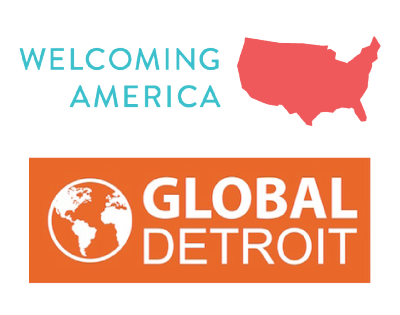Michigan Tackling Brain Waste Head On
/in All Blogs, Immigrant Retention /by gglnadminA broad range of actors in Michigan are working together to tackle the issue of “brain waste”—the unemployment and underemployment of college-educated and professional immigrants and refugees. In many cities it is cliché to encounter the cab-driving immigrant engineer or refugee doctor waiting tables. But these examples of “brain waste” underscore real hardship for immigrants and refugees, and a real cost to the local economy. Michigan, like the rest of the Rust Belt and nation, suffers from a shortage of skilled workers—engineers, doctors, IT professionals, etc.—skills that many immigrants and refugees possess.
National leaders from the New American Economy (NAE) and World Education Services (WES) Global Talent Bridge joined Michigan Governor Rick Snyder’s Cabinet Director Mike Zimmer in a summit co-hosted by WE Global Members Global Detroit, the Michigan Office for New Americans (MONA). The May 1 summit included some 75 participants from refugee resettlement agencies, workforce development agencies, immigrant and ethnic service organizations, community colleges, the Detroit Mayor’s Office of Immigrant Affairs, and local employers.
In December 2016, NAE and WES joined the Migration Policy Institute in releasing the first-ever report quantifying the economic costs of “brain waste.” The report estimated that there are nearly two million highly-skilled immigrants in the U.S. working in low-skilled jobs or who are unemployed. This amounted to nearly $40 billion in lost wages and more than $10 billion in lost taxes.
The December 2016 study included deeper analysis in seven states including Michigan. Unlike the rest of the nation, Michigan’s “brain waste” for immigrants was no higher than for U.S.-born college-educated workers. There are several factors that contribute to the relative success of professional immigrants and refugees in Michigan, including high numbers of advanced degrees (54 percent of Michigan’s college-educated immigrants have an advanced degree compared to 36 percent nationally), stronger English skills, high penetration of work-related visas, and, as noted in the research, state and local “efforts not only to attract skilled immigrants and entrepreneurs, but also to reduce their underemployment.”
Global Detroit and MONA have been hard at work on these issues and the desire by national experts to release new data focused on Michigan and to discuss best practices in Detroit is a testament to our success. The Michigan International Talent Solutions (MITS) housed in MONA has helped to provide individual direct service to skilled-immigrants, in partnership with Upwardly Global. The average salary increase of skilled immigrants placed by the program is over $40,000. The State of Michigan also has written nearly 50 licensing and credentialing guides written for foreign-trained and educated professionals. Add to that the 124 Cultural Ambassador matches that Global Detroit has made for immigrant professionals and international students, as well as the Global Detroit Welcome Mat and other welcoming activities, and the evidence is clear that Michigan is “all-in” on this issue, according to Governor Snyder’s Cabinet Director Mike Zimmer.
“Michigan and Detroit are light-years ahead in combating brain waste,” noted WES Global Talent Bridge’s Director of Partnership and Program Development Katherine Gebremedhin. Her affirmations about our leadership were echoed by Paul Feltman, WES Global Talent Bridge’s Director and New American Economy’s Director of State and Local Initiatives Kate Brick who summed up the day’s underlying purpose, “Our country will only be successful if we welcome immigrants to help us build prosperity.”
Great Lakes Economic Forum Highlights Immigrant Economic Development Strategies
/in All Blogs /by gglnadminWE Innovate: PhillyiHub strengthens Philadelphia’s economy and neighborhood
/in All Blogs, Immigrant Small Business Owners, Immigrant Entrepreneurs, Immigrant Entrepreneurship, Diversity /by gglnadminRust Belt Innovation Leads U.S. Efforts to Utilize Untapped Immigrant Talent
/in All Blogs, Immigrant Retention, Diversity /by gglnadminWE Innovate: With Love, Pakistan – Entrepreneurial Incubator Launches in Syracuse
/in All Blogs /by gglnadmin2016 Convening Perspective: Q&A with the Hosts
/in All Blogs, 2016 Convening /by gglnadminLast month, Welcoming Economies Global Network (WE Global) brought together some 300 leaders in immigrant economic development for our 2016 Convening in Philadelphia. The Convening included workshops to highlight cutting edge policies, successful programs, and innovative ideas that welcome, retain, and empower immigrants as valued contributors to our economies. The Convening was co-hosted by the Welcoming Center for New Pennsylvanians and City of Philadelphia Office of Immigrant Affairs. We caught up with Welcoming Center’s Rebecca Rathje and Nicole Pumphrey, and Office of Immigrant Affairs’ Hani White and Miriam Enriquez to get their take on the Convening, and how hosting will provide momentum to the work in Philadelphia.
1. What inspired you to host the 2016 Convening?
Rebecca: Greater Philadelphia has resurfaced as a destination of choice for immigrants and refugees from across the globe. Here in Philly, a rich network of cross-sector services specifically designed to address the challenges and highlight the assets of newcomers has helped the Philadelphia metro area generate a strong welcoming environment that we’re very proud of. This rich ecosystem tells the WE Global Network story, and I think made Philly the perfect place to host, to share what we’ve learned, and move the work and Network forward.
Miriam: One of our great partners, the Welcoming Center for New Pennsylvanians, put in for Philadelphia to be the host. There was agreement from then Mayor-elect Kenney. We were inspired by the work that has been done in the past. This was a wonderful opportunity for Philadelphia to highlight our great work.
Hani: We Global Network’s work is really impressive, and we are glad that we could host this year, and we were inspired to share our amazing work in City of Philadelphia with others.
2. What was your most inspiring moment of the Convening?
Nikki: When we initially applied to be the host city, we wanted to be able to highlight the work being done locally and to engage as many partners as possible. For us, it was important to uplift those organizations making change at the neighborhood level. It was inspiring to see more than 20 community-based organizations in 5 neighborhoods come together to host to more than 100 people!
Miriam: I was inspired by the great speakers – Anne O’Callaghan, Osagie Imasogie, and Yasmine Mustafa, and all of the different perspectives on why immigrant integration is so important and the contributions immigrants bring to the local and national economy.
3. What did you learn that will be useful in your work moving forward?
Nikki: A few sessions provided tools on how to best weave the story of immigrant integration into mainstream economic development and workforce development strategies. As an organization that is often trying to find and leverage this intersection, tools to be able to do this work (and identify additional opportunities) is valuable.
Miriam: The Increasing Civic Participation within Immigrant Communities session was helpful as a representative with a government office to learn different ways to continue to engage our immigrants in the civic process.
Hani: I would like to join with next cohort of Welcoming America’s Welcoming Communities Transatlantic Exchange, which is an opportunity to visit other cities, as the first cohort did when it went to Germany and hosted a German delegation earlier this year. Participants from the Transatlantic Exchange shared their takeaways, and Betsy Cohen (St. Louis Mosaic Project) expressed returning home feeling extremely connected to the work, and to the global refugee crisis, and motivated to continue working for positive change.
4. How do you feel this movement has changed over last 5 years?
Nikki: With new research emerging (like recent state-level reports from New American Economy and WE Global and Fiscal Policy Institute’s data showing that immigrants should be an important component of vacant and distressed housing revitalization), making the case that immigrants drive economic growth has become that much easier. However, this election cycle and the current climate in the country has made abundantly clear that we live in a country divided. There is hard work ahead to ensure that this nation remains a place for all in search of opportunity, where diversity is seen not as a threat, but an asset.
Miriam: Although I am new to this area of work, in the short time I have been here, there has been so much talk both nationally and locally about the contributions of immigrants to our economy. Economic development and the economic contributions of our immigrant communities is an area that needs a brighter spotlight. When people hear the real numbers, they are always amazed. Convenings like this help in that effort.
Hani: The work of WE Global Network and its members is growing in an awesome direction as more people and organizations are getting involved. And most important that city and government official work hand in hand with nonprofits organization, CDFI, CDC, refugee resettlements, etc to elevate live quality of Immigrants

